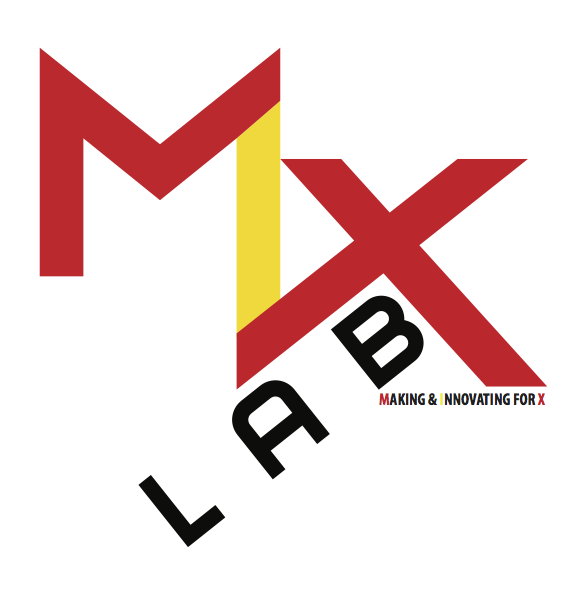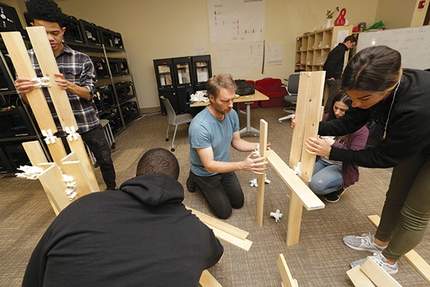Disclose, deviate and emerge: Montclair State's MIX Lab disrupts expectations in pursuit of innovation
The below post is the result Arthur Augustyn of NJ BIZ interviewing Iain Kerr and Jason Frasca of the MIX Lab and concluded with Arthur spending a day in the MIX Lab observing a class. Disclose, deviate and emerge: Montclair State's MIX Lab disrupts expectations in pursuit of innovation by Arthur Augustyn originally appeared in NJ Biz on January 2, 2018:
Josh Miller entered his school's entrepreneurship program with his own idea already in mind. An aspiring musician and business management major at Montclair State University, he took the school's introductory 3-D printing course hoping to learn how to make outlandish guitar models.
Montclair State University's Making and Innovating for X (MIX) Lab co-director Iain Kerr, center, works with Innovation Class students on an experimental connector exercise with 3-D-generated forms. - (AARON HOUSTON)
Miller soon learned the course wasn’t meant to provide the tools to pursue his own project, but rather teach students how following the process of innovation can provide a more meaningful product than the one they originally sought to make.
“If you let people solve a problem, they already have an answer that they’re excited by, they fixate on that,” said Iain Kerr, co-director of Montclair State University’s Making and Innovating for X (MIX) Lab, a 3-D printer lab with nearly 50 printers available for students and members of the community.
Miller was determined to pursue his own idea, but the program required him to put that aside to learn the process of innovation.
Each course is centered around a concept of design distilled to a concept. Miller’s first course looked at the concept of “eating,” and asked how someone could innovate on feeding the hungry or providing more nutrition.
“We found if we define a theme or a topic it actually gives [students] more freedom because they’re not fixated by an answer, they focus on learning the process,” said Kerr.
The result can produce wild results. Miller’s class included a group that expanded the concept to ask “what if every object was alive and could eat?” This line of thought brought the group to design mycelium-based roads, a type of mushroom fungus that could “eat” pollution.
“We get them to redefine the framework and the paradigm they’re using to see where it takes them,” said Kerr. “It usually takes them far from where they started. That’s what we want to teach.”
Montclair State’s MIX Lab are based out of the school’s Feliciano Center for Entrepreneurship. The labs were first opened in 2015 to support the entrepreneurial program at the university.
“We noticed that the prototypes by our startup teams — they weren’t as good as they could have been,” said Jason Frasca, co-director with Kerr of MIX Lab. “We saw an opportunity to bring 3-D printers to our program and started the lab for that purpose.”
The majority of the printers are sixth-generation Makerbot 3-D printers, with additional printers available to upperclassmen for making higher-quality prototypes. Students create their designs using software called Fusion 360 made by 3-D design and engineering company Autodesk.
When Frasca and Kerr conceived of the MIX Lab, they wanted to provide students with a framework for how to come up with innovative ideas instead of making minimal upgrades to established products.
“They see a cat-litter box and think ‘it could be better if it absorbed odors,’ but it’s a very small improvement and often it’s something being done by hundreds of other designs they don’t know about,” said Kerr. “We realized that we had to teach something more robust or else we’re setting people up to fail.”
Miller entered the course having never seen a 3-D printer before and immediately jumped into multiple group projects that each had their own ideas. Now, two years later, Miller is now a fifth-year student at MSU and has been involved with over 15 different projects to varying degrees. He stepped away from the guitar project, but found his other projects are informing how to better achieve his own, and understanding the innovation process can be more important than learning the physical skills required to create something.
“I’m finding that [the guitar project] is not necessarily as hard as I thought,” Miller said. “A lot of what the class teaches isn’t how to use your physical mediums but how to think in a pathway that gets you to that outcome.”
The MIX Lab program has three principles that guide students to innovative outcomes: disclose, deviate and emerge.
Students are initially asked to understand (or “disclose”) a design and distill it to its conceptual core. For example, students in the most recent semester were asked to examine “human well-being” and specifically looked at a soap dish to brainstorm all possible improvements of its design. They then were asked to “block” that information and create innovations outside of the established knowledge.
“Once you disclose everything you know, then you aren’t allowed to use anything from that world,” said Frasca. “That forces you to think outside of the box and come out of your comfort zone for new ideas that you’ve never thought of before.”
Students discovered the concept of a soap dish can be distilled to “clumping,” that the dish is meant to condense or “clump” its contents.
From there students enter the second part of the process by deviating from a design’s conceptual core. In this case, students found the opposite of “clumping” would be “separating” and were tasked with exploring how the concept of separating could be used for a soap dish or another design related to “human well-being.”
Innovation Class student Toniann Psaros works on an experimental connector exercise with 3-D-generated forms in the MIX Lab at Montclair State University. - (AARON HOUSTON)
Once an innovation is discovered, students reach the final stage of the process, and a new design emerges.
“It’s about creating seemingly wacky ideas to outsiders, but it’s impressive what people can come up with,” said Miller.
MIX Lab courses typically have four exercises across a semester that look at these three guiding principles in dramatically different ways. These assignments can range from being philosophically abstract to concrete and practical.
As much as the course focuses on abstract conceptual thinking, the process can lead to building practical skills that members of the New Jersey business community are already utilizing.
Gearhart Law, a patent, trademark and copyright firm based in Summit, maintains an agreement with Montclair State that allows the firm to hire eligible students from the MIX Lab program as contractors. Students work on developing prototypes for patented ideas for an hourly rate that starts at $15 an hour with the potential for more depending on the project.
“Our clients love it,” said David Postolski, partner for Gearhart Law. “It gives them the opportunity to work with students and 3-D printing and it’s cheaper than prototype houses.”
Postolski was guest teaching at Montclair State when he heard about the MIX Lab. Gearhart Law has had an agreement with the school since August and has already had four clients utilize students as contractors.
“This is more than just students using [3-D] printing, but using it to help others such as inventors and small companies to get their products to market,” said Postolski in an email.


